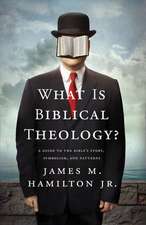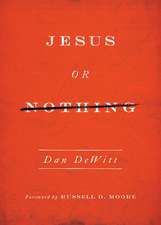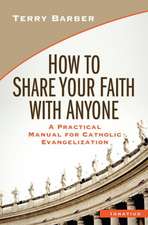What the Rabbis Said: 250 Topics from the Talmud
Autor Ronald L. Eisenberg M.D.en Limba Engleză Hardback – 2 aug 2010 – vârsta până la 17 ani
Preț: 350.47 lei
Preț vechi: 478.98 lei
-27% Nou
Puncte Express: 526
Preț estimativ în valută:
67.07€ • 69.60$ • 56.06£
67.07€ • 69.60$ • 56.06£
Carte tipărită la comandă
Livrare economică 17-31 martie
Preluare comenzi: 021 569.72.76
Specificații
ISBN-13: 9780313384509
ISBN-10: 0313384509
Pagini: 360
Dimensiuni: 156 x 235 x 33 mm
Greutate: 0.7 kg
Editura: Bloomsbury Publishing
Colecția Praeger
Locul publicării:New York, United States
ISBN-10: 0313384509
Pagini: 360
Dimensiuni: 156 x 235 x 33 mm
Greutate: 0.7 kg
Editura: Bloomsbury Publishing
Colecția Praeger
Locul publicării:New York, United States
Caracteristici
Numerous endnotes provide a wealth of information for the scholarly reader without interrupting the flow of the text
Notă biografică
Ronald L. Eisenberg, MD, JD, is associate professor of radiology at Harvard Medical School and a staff radiologist at the Beth Israel Deaconess Medical Center in Boston, MA.
Cuprins
Foreword by Elliot LefkovitzPrefaceIntroduction: The Rabbinic PeriodChapter 1: GodExistence of GodNames of GodEternity of GodUnity of GodHoliness and Perfection of GodOmnipotence of GodOmnipresence of GodOmniscience of GodTranscendence and Immanence of GodShechinahBat KolRuach ha-KodeshAngelsIncorporeality of GodFatherhood of GodJustice and Mercy of GodImitation of GodLove of GodFear of GodGod and the Human SoulReward and PunishmentTheodicyGod and MiraclesIdolatryChapter 2: TorahOverviewWritten TorahAuthorshipCanonizationHermeneuticsBiblical CommentaryCreationMetaphysical Speculation (Cosmology)Creation of ManCreation of WomanHeavenly BodiesSunMoonAstrologyTen CommandmentsStructure and ArrangementUse in the LiturgyProphetsOral TorahMishnahBaraitaTalmudFence around the TorahTorah ScrollTorah StudyScholarsTeaching TorahChapter 3: MitzvotOverviewEnumeration of the MitzvotRabbinic CommandmentsNoahide LawsReasons for Observance of the Mitzvot (Ta'amei ha-Mitzvot)Performance of the MitzvotRewards for Performance of the MitzvotObligation of Women to Perform the CommandmentsChapter 4: Proper Behavior and Ethical LivingDerech EretzGemilut Chasadim (Loving-kindness)Tzedakah (Charity)Who Must GiveWho May ReceiveHow Much One Should GiveHow to GiveHachnasat Orchim (Hospitality)Bikur Cholim (Visiting the Sick)Pikuach Nefesh (Saving a Life)Netilat Yadayim (Washing the Hands)Niddah (Menstruating Woman)JusticeJewish CourtsJudgesTrialsWitnessesAppellate ProcessHumilityModerationBurying the PastCleanliness/Care of the BodyClothes/Dress CodeFaithForgivenessJudging Others FavorablyKeeping SecretsLove Your NeighborDivine MeritNot Putting a Stumbling Block before the BlindNot Shaming OthersNot Taking Revenge/Bearing a GrudgeRansoming CaptivesRebuking a SinnerSilenceWisdomChapter 5: Negative Traits and ActionsAngerFoolish PietyInformersLashon ha-RaLyingSinWorryChapter 6: Children, Parents, and EducationChildrenParentsObligations of Parents toward ChildrenParental Advice to ChildrenEducation/Teaching TorahEducation for GirlsSecular KnowledgeChapter 7: Law and PunishmentCivil LawNegligenceLost and Found PropertyBailmentInheritanceEquityCriminal LawTheftBatteryMurderPunishmentCorporal PunishmentCapital PunishmentChapter 8: Earning a LivelihoodLaborEmployer-Employee RelationsOccupationsPoverty and WealthBusiness EthicsLending at InterestChapter 9: The Jewish People, the Land of Israel, and Diaspora ExistenceJewish PeopleCommunityAm ha-AretzAssimilationLand of IsraelDiaspora Existence (Dina Malchuta Dina)Chapter 10: Life Cycle EventsThe Stages of LifeThe First 13 Years of LifeBirthCircumcisionNamesPidyon ha-BenBar MitzvahConversionConversion ProcessAttitudes Toward ConvertsConversion of a ChildMarriageRabbinic Views on MarriageArranging MarriagesMarriage CeremonyWedding CelebrationHuppahBreaking the GlassKetubahHarmonious Married LifeObligations and Rights of Husband and WifePolygamyIntermarriageSexContraceptionAdulteryMamzerPremarital SexHomosexualityMaleFemaleDivorceDivorce Other Than by ConsentConsequences of DivorceAgunahDeathThe Dying ProcessAngel of DeathBurialFuneral ServiceCemeteryHeadstoneMourningAninutShivahSheloshimFirst YearEuthanasiaAfterlife and the World to ComeWho Merits an Afterlife?ConclusionMessiahChapter 11: Sabbath and FestivalsSabbathObservancesKindling the Sabbath LightsKiddushSabbath MealsZemirotRestrictionsWorkCarryingTravelHavdalahFestivalsOverviewHallelRosh HodeshBirkat ha-HodeshHigh Holy DaysRepentanceRosh HashanahShofarU-Netaneh TokefSpecial FoodsYom KippurConfessionsFall FestivalsSukkotSukkahFour SpeciesWater-Drawing CeremonyWinter FestivalsChanukahKindling the Chanukah LightsTu b'ShevatPurimShushan PurimMajor Characters in the Book of EstherSpring FestivalsPassoverChametzSederFour QuestionsFour Cups of WineFour ChildrenMatzahMarorHarosetAfikomanOmer PeriodShavuotFast Days and Summer FestivalsFast Days and FastingTisha b'AvTu b'AvChapter 12: Synagogue and PrayerSynagogueOverviewMechitzahNer TamidRabbiSemichahSermonHazzanPrayerOverviewTime for PrayerLength of PrayerIntentionRegularity of PrayerDirection of PrayerLanguage of PrayerImproper Forms of PrayerImproper Places for PrayerAddressing Prayers Directly to GodProper Attire for PrayerGestures/Positions in PrayerAnswer to PrayerCongregational PrayerGod's PrayerMinyanHead CoveringWomenTallitTefillinBlessingsAmenSynagogue PrayersKaddishShemaAmidahAshreiTorah ServiceAliyotTorah BlessingsReading the TorahOther Functionaries Related to the Torah ReadingHaftarahMaftirPsalm of the DayPersonal PrayersBedtime PrayersBlessings before EatingGrace after Meals (Birkat ha-Mazon)Tefillat ha-DerechThanksgiving Blessing (Birkat ha-Gomel)Chapter 13: Food and DrinkOverviewDietary Laws (Kashrut)ShechitahMixing Milk and MeatRationales for the Dietary LawsSpecific Foods and DrinksBreadEggFishFruitsGarlicMeatMilkOilSaltVegetablesWaterWineChapter 14: HealthOverviewSleepRegular Bowel MovementsBloodlettingAgingEnvironmentBal TashchitChapter 15: Superstitions and MagicSuperstitionsDemonsDivination and OmensEvil EyeGolemChapter 16: AnimalsCruelty to AnimalsAnimal BehaviorSpecific AnimalsChickenDogDoveGoats and SheepHorseLionMousePigScorpionSnake (Serpent)Mythical CreaturesLeviathanBehemothChapter 17: MiscellaneousAdviceBeardCustomDreamsEuphemismsFree WillFriendsGematriaMartyrdomRainPrayer for RainRighteous (Tzadikim)SatanYetzer ha-Ra and Yetzer ha-TovBibliographyGlossaryTalmudic Abbreviations












